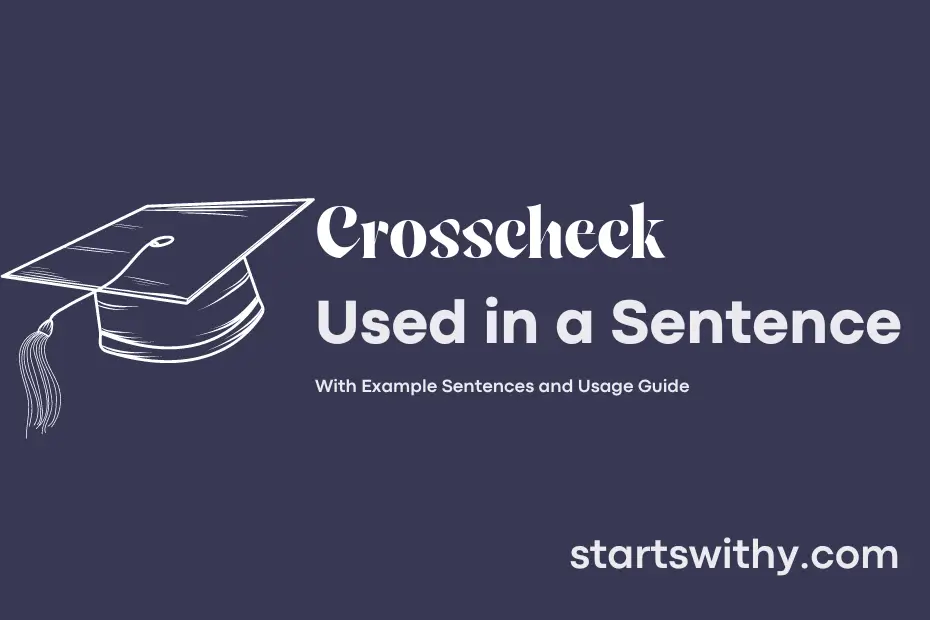Have you ever encountered the term “crosscheck” in your reading or conversations and wondered what it means? Essentially, to crosscheck is to verify or confirm information by comparing it with other sources, data, or facts. This process helps ensure accuracy and reliability in various fields of work and study.
The concept of crosschecking is an essential element in research, data analysis, fact-checking, and problem-solving. By crosschecking information, individuals can detect errors, prevent misinformation, and reach more informed conclusions. Let’s explore the significance and practical applications of crosschecking in different contexts.
7 Examples Of Crosscheck Used In a Sentence For Kids
- Crosscheck your colors before you start coloring.
- Make sure to crosscheck your numbers when counting.
- Always crosscheck your answers before turning in your homework.
- Remember to crosscheck the spelling of your name on your papers.
- You can crosscheck with a friend to make sure you both have the same answers.
- Don’t forget to crosscheck the shapes in your drawing.
- Take a moment to crosscheck your work to make sure it’s correct.
14 Sentences with Crosscheck Examples
- Crosscheck the due dates for your assignments to avoid any last-minute rush.
- Before submitting your research paper, make sure to crosscheck all the sources you have used for accurate citations.
- It is always a good practice to crosscheck the exam schedule to prevent any confusion.
- Crosscheck the eligibility criteria of the internship program before applying.
- Before finalizing your course selection, remember to crosscheck the prerequisites.
- Make sure to carefully crosscheck the calculations in your project report to avoid any errors.
- It is essential to crosscheck the study material provided by your professors for accuracy.
- Before purchasing any study material online, crosscheck the reviews and ratings of the seller.
- When registering for courses, don’t forget to crosscheck the timings to avoid timetable clashes.
- Before believing any information shared in group discussions, always remember to crosscheck the facts.
- After completing online assessments, it is advisable to crosscheck your answers before submission.
- Crosscheck the syllabus with your professor to ensure you are studying the right topics for your exams.
- Before sharing study notes with your classmates, make sure to crosscheck for any errors or missing information.
- It is always a good idea to crosscheck your project proposal with your professor before starting the actual work.
How To Use Crosscheck in Sentences?
Crosscheck is a tool used to ensure the accuracy and reliability of information. It can be a valuable resource for fact-checking and verifying data before sharing it with others. To use Crosscheck in a sentence, simply insert the word into your writing to indicate that you have confirmed the information to be true and accurate.
For example:
“The journalist decided to crosscheck the sources before publishing the article.”
“Before finalizing the report, it is important to crosscheck all the data for any errors.”
“Crosscheck the information with multiple sources to make sure it is accurate.”
When using Crosscheck, it is essential to double-check the information from various reliable sources to ensure its credibility. By doing so, you can avoid spreading misinformation and maintain your credibility as a writer or communicator. Remember to use Crosscheck as a verb to emphasize the action of verifying information rather than just mentioning the tool itself.
In conclusion, Crosscheck is a valuable tool for fact-checking and verifying information. By incorporating it into your writing, you can convey the message that you have taken the necessary steps to ensure the accuracy and reliability of the information you are sharing.
Conclusion
In conclusion, the importance of crosschecking information cannot be overstated. By verifying details through multiple sources, such as fact-checking websites or official documents, individuals can ensure the accuracy and reliability of the information they encounter. Crosschecking helps avoid misinformation, false claims, and inaccuracies, ultimately leading to more informed decision-making and discussions.
Whether it’s in news articles, research papers, or everyday conversations, incorporating the practice of crosschecking into our information consumption habits is crucial. It empowers us to distinguish between fact and fiction, promoting a more trustworthy and credible exchange of ideas. By embracing crosschecking as a routine part of our information validation process, we contribute to a more discerning and informed society.



